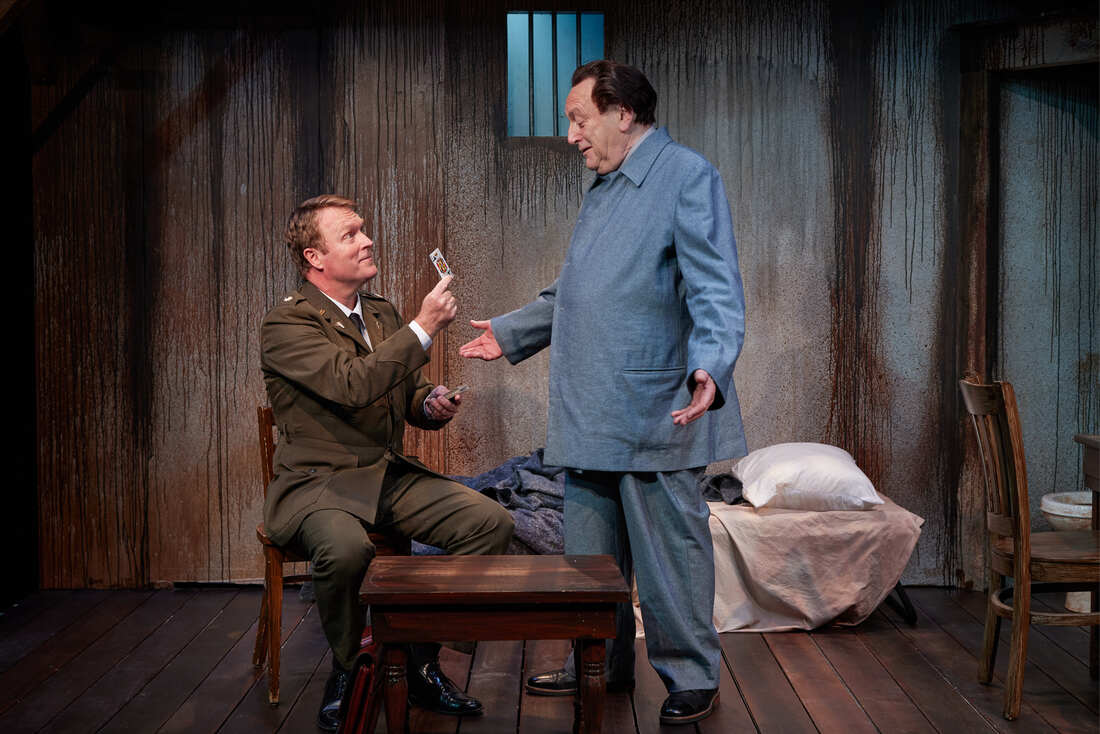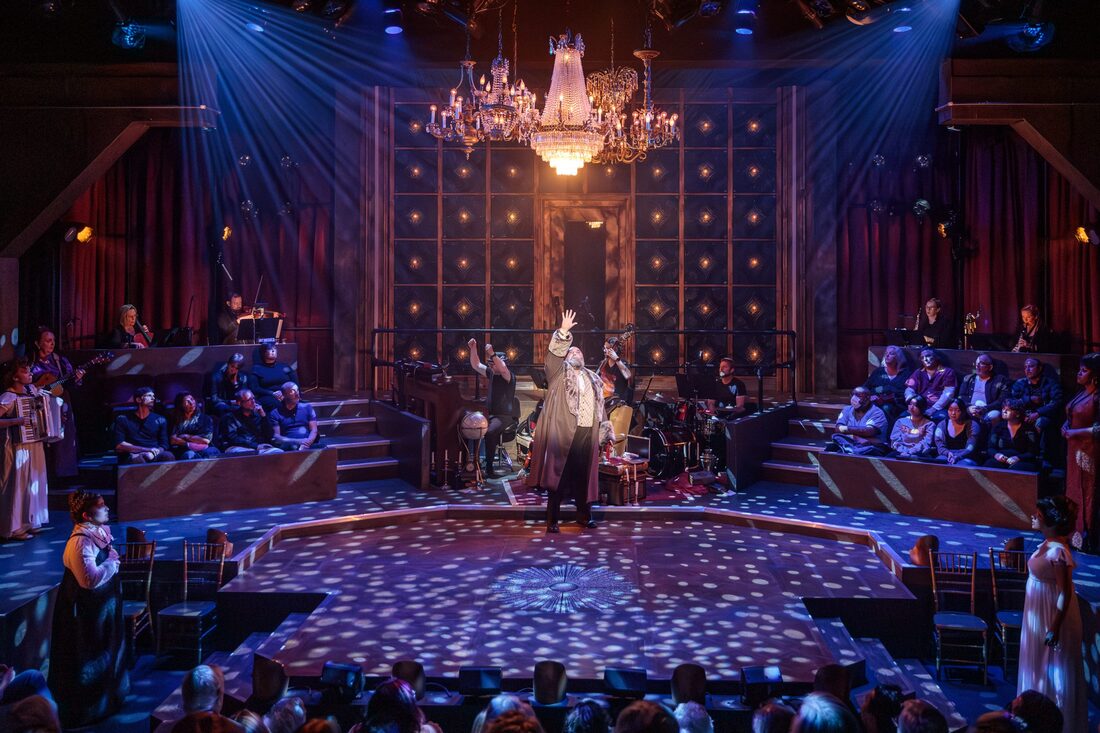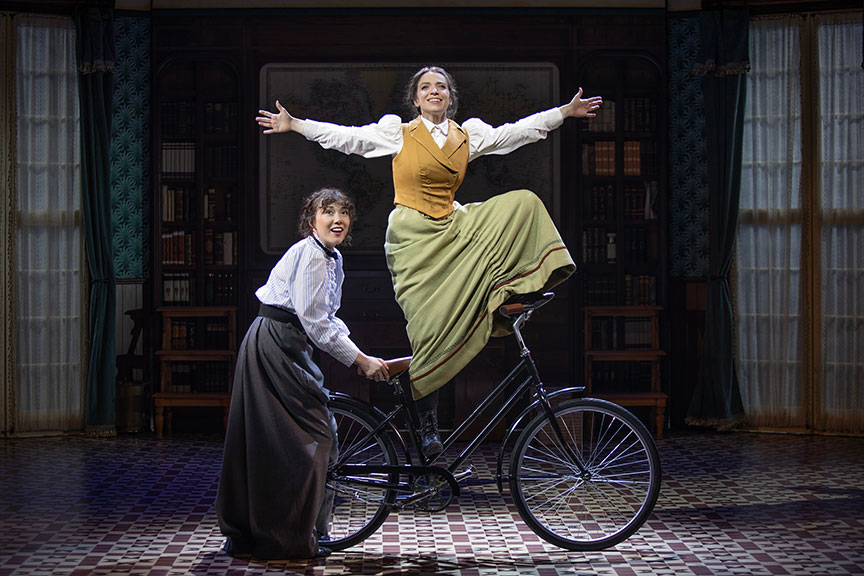|
Brendan Ford (left) and Frank Corrado in "Sense of Decency." Photo by Aaron Rumley I remarked to the ticket usher on my way into see “Sense of Decency” the other night at the North Coast Rep that 90-minute, no intermission shows were always music to my ears.
She immediately reminded me that these would be 90 very tense minutes. Lesson: Listen to your usher. This world-premiere play written by and co-directed (with David Ellenstein) by Jake Broder is based on Jack El-Hai’s book “The Nazi and the Psychiatrist.” Just as you might say the premise of “Titanic” is “ship sinks,” you could say that “Sense of Decency” is indeed a story of a Nazi and a psychiatrist. In terms of gravitas, however, James Cameron’s mega-movie and this historical examination couldn’t be further apart. El Hai’s 2013 book (the full title is “The Nazi and the Psychiatrist: Hermann Goring, Dr. Douglas M. Kelley, and a Fatal Meeting of the Minds at the End of WWII”) tells the story of Army psychiatrist Kelley’s sessions in a Nuremburg prison with the infamous Goring. His job was to make sure that Goring, and other imprisoned Nazis like him, were healthy and mentally sound enough (meaning not on the verge of suicide) to stand trial. What Kelley did was mine Goring’s psyche for answers to what could cause such evil. The dramatic device of staged psychiatric interview is a tired and ubiquitous one in theater, television and film, an economical way to get inside the head of the patient and REVEAL something. But as the centerpiece of “Sense of Decency” it makes for compelling theater. Broder also has built in scenes and asides with both Kelley’s wife Dukie and Goring’s wife Emmy (each played by Lucy Davenport) that allow the probing psychiatrist (Brendan Ford) to step out of the prison-cell setting and air his feelings, his anxieties, his shifting analyses. Further, the sessions with Goring (Frank Corrado) are bookended by scenes between Ford and Davenport that establish the doc’s character and, on the back end, demonstrate his own psychological metamorphosis. In an interview with me for the San Diego Union-Tribune recently, Broder emphasized that in researching Goring, he found the man to be less immoral than outright amoral, a manipulative narcissist to the nth degree. In a studied performance that is also chilling because we know the backstory of this terrible Reichsmarschall, Corrado demonstrates this very Goring that Broder discovered. Utilizing ingratiation, stupid (and racist) little jokes and unexpected restraint when challenged, this Goring plays Kelley, who brings his own bag of tricks, futilely, to the prison cell, with ease. Much of what Broder’s script illuminates is how, tragically, the Nazi basis for the Final Solution was inspired by among others America, the high-minded nation that fought a war for slavery and even at the time of the Nuremburg trials had a bloody history of racism (though Nikki Haley would deny that, remember?). Corrado’s Goring plays this card in his encounters with Kelley, whose own psychiatric card tricks pale by comparison. At first indignant and defensive and outraged, Kelley comes to recognize the undeniable truth in the universality of hate, exclusion and worse – and this carries the character into the devastating last half-hour of the play. That’s when Kelley tries to make the world see what he sees. He does not deny the horror of Goring and the Reich, but what he believes he has learned goes beyond that prison cell. After an uneven beginning on the evening I saw “Sense of Decency,” Ford seizes his character and reflects Kelley’s desperation and deteriorating vividly as the play winds its way toward a startling conclusion. This is a tautly performed and frequently riveting hour and a half of theater that should make one examine with careful and uncompromising thought the past and the present. Come to think of it, where we may be headed as well. “Sense of Decency” runs through May 12 at North Coast Repertory Theatre in Solana Beach.
0 Comments
Kurt Norby in "Natasha, Pierre & the Great Comet of 1812." Karli Cadel Photography Coinciding with the melodramatic love triangle that’s at the heart of “Natasha, Pierre & the Great Comet of 1812” is the profound and personal search for one’s place in a turbulent world and for meaning in an unfathomable universe. That is the overarching inquiry of the great Russian writers, Tolstoy among them. His prodigious “War and Peace,” published in 1869, is the foundation of Dave Malloy’s operatic musical “Natasha, Pierre & the Great Comet of 1812.”
Drawing from only a 70-page sequence deep inside “War and Peace,” Malloy, who once entertained on cruise ships yet, created this stunning and immersive show. It spent only a year on Broadway between 2016 and 2017 but rode the star power of co-stars Josh Groban and Denee Benton to 12 Tony Award nominations. (It only won two, of the minor variety, but that is what it is.) Cygnet Theatre’s West Coast premiere of “Natasha, Pierre & the Great Comet of 1812” is a triumph of magical theater-making. Directed by Sean Murray with musical direction by Patrick Marion and choreography by Katie Banville, this is the sort of uncanny production that you can’t help but become part of, on many levels. There’s the spectacle of period costumes (designed by Shirley Pierson) that transport you to the turn of the 19th century in Moscow. There’s a breathless second-act display of Russian folk dance that cascades over you like a big wave and demands giddy and irresistible participation. There are yearning, questioning numbers sung by the brilliant but morose Pierre (Kurt Norby, in a tour de force) that will swell inside you. The show can also be funny as hell, played as some of it is with tongue planted in cheek. This is best personified by the false suitor Anatole (Michael Louis Cusimano) and the sultry and scheming Helene (Jasmine January). Even protagonist Countess Natasha (Selena Ceja) spoofs her own sweet earnestness in much of the first act. I may be wrong, but I’m imagining that a sizable majority of theatergoers who see this show have not read “War and Peace” or if they have, it was eons ago. In a clever and convenient way, Cygnet has provided for patrons a program that essentially sums up the premise of “Natasha, Pierre …” in six bullet points. More whimsically, that’s followed by a two-page “Family Tree” illustration with caricatures of the story’s principals accompanied by the one-word character descriptions that are heard in the show’s rousing opening “Prologue” which in its countdown is reminiscent of “The Twelve Days of Christmas”: “Natasha is young”; “Andrey (the soldier at war to whom she’s betrothed) isn’t here”; “Helene is a slut”; “Anatole is hot.” And inscrutably “And what about Pierre?” That’s the question that lingers throughout the sung-through show. Pierre is always on stage, though often seated in the background in a chair with one of the books to which he escapes, devotedly). When he does step into the fray, “Pierre, Natasha & the Great Comet of 1812” rises far above its garden-variety, chest-heaving love story. It’s one where Natasha, who has mourned the absence of her fiancée (in the swooning “No One Else”) is inexplicably, at least to me, motivated to forget all about him because of the foppish attentions of dashing though shallow Anatole. Attempting in vain to discourage her transposition of affections is her heady cousin and confidant Sonya (Megan Carmitchel) and her domineering godmother Marya (Linda Libby). How this familiar narrative becomes something far more meaningful speaks to the genius of Tolstoy and the ingenuity and imagination of Malloy, whom we have to thank for “Natasha, Pierre & the Great Comet of 1812,” and the Cygnet team, whom we must praise. This is among the most ambitious and rewarding productions I’ve seen at the Old Town theater since I began reviewing shows 15 years ago. Once in a blue moon there’s a palpable sense of excitement and anticipation, a vibe, inside a theater in the minutes before a production begins. This was the case at Cygnet on opening night. It’s the kind of energy theater-makers would love to bottle and store in reserve for recurring use. Adding to the interactive nature of the production, a few short rows of seats have been placed on the stage, offering I presume a distinctive viewing experience. You’re much closer to the band, but I wouldn’t think that a bad thing – the skilled seven-piece orchestra conducted by Marion features PJ Bovee on bass, Amy Kalal on oboe and English horn, Dave Rumley on percussion, Erika Boras Tesi on cello, Ariana Warren on clarinet and bass clarinet, and Sean La Perruque on violin and viola. “Natasha, Pierre” enjoys many dazzling moments, including an at-the-opera scene where costuming, masks, lighting (by Amanda Zieve) and music come together in a transformative and even haunting way. I don’t want to give away the ending of the show, but it’s guaranteed to stir you. Norby is the essential presence in this production, though Ceja as Natasha gets far more of the stage time. Recently seen as Wednesday in San Diego Musical Theatre’s “The Addams Family,” she has graduated to a far meatier role at Cygnet, and she does not disappoint. Carmitchel, one of the brightest stars in local theater, has a less prominent role, but she is so reliably gifted that it doesn’t matter. She gets a couple of solos here (on “Sonya Alone” and “Natasha Very Ill”) and makes the most of them. Luke H. Jacobs, Brian Mackey and Tanner Vydos contribute in vivid supporting roles – Mackey’s reward for playing the sober and humorless Andrey is that he gets the broadest comedic turn, too: portraying the crippled and cranky father of Natasha’s intended. On the way out of the theater in misty rain I thought about how many moving parts there are in “Natasha, Pierre & the Great Comet of 1812” and what an achievement this truly is for Sean Murray and Cygnet. Don’t miss this extraordinary show before it closes on May 19. Livvy Marcus (left) and Alex Finke in "Ride." Photo by Jim Cox Annie Kopchovsky, who became Annie Londonderry, may not have been an outright fabulist, but she was a fabulous storyteller. That’s the setup for the one-act musical “Ride,” in which having completed an around-the-world trip on a bicycle, Annie embarks on a new quest: convincing newspaper publisher Joseph Pulitzer to make her a regular columnist.
Doing so requires an image projector, which it turns out is broken, so the ever-resourceful, unstoppable Annie does the next best thing: She acts out her circumnavigation-on-wheels, with its keenest adventures and misadventures, right there in Pulitzer’s office and recruits the publisher’s mousey little secretary Martha to abet the re-creations. Did these episodes really happen? We know that this Jewish Latvian immigrant from Boston did indeed become the first woman ever to cycle around the world, between 1894 and 1895. The circumstances of what precipitated that feat and exactly what or who Annie encountered on her trip are debatable. The real-life Annie colorfully told her wondrous tales when she returned, as does the Annie of “Ride” (played with loads of moxie by Alex Finke). As the show makes clear, showmanship – or show-womanship – was this indomitable person’s stock in trade. Created by Freya Catrin Smith and Jack Williams, and directed by Sarah Meadows, “Ride” was a theatrical sensation in London. The Old Globe staging is its U.S. premiere. Here, it’s on a bigger stage and, as Meadows told me in a San Diego Union-Tribune interview, it’s been as such reinvented to a degree. The 90-minute show is duly entertaining with its snappy tunes, delightful stage props and no small exercising of physical comedy. Livvy Marcus as Martha gets to quick-change and multiple-impersonate throughout, portraying as she does the most important acquaintances (and perhaps more than that) that Annie meets along her journey. Finke has remarkable stamina in a production that she practically carries by herself, though the Boston (?) accent in which she speaks with so much stridency throughout comes off like a Streisand knockoff. It’s distracting and, I think, unnecessary. Her singing, on the other hand, is pure and pleasing, whether on a rousing number like the show’s title tune or the lilting lullaby near the end that punctuates Annie’s (and the story’s) true reality check. The construction of “Ride” is curious. Annie’s pitch to Pulitzer and the dramatization of her escapades around the world feel like two different shows, to the point where it’s easy to forget that she’s pitching to Pulitzer in the first place. Furthermore, the almost-relationships she has – with a customs agent and then a married man riding his own bicycle (both played by Marcus) – simply come and go. By the time we get that aforementioned reality-check scene, Annie is already a mass of contradictions. I admit it escapes me why “Ride” was so popular in London that many folks reportedly saw it again and again. It’s a fast-paced if not frantic diversion with a supporting character (Martha) who’s more likable than the protagonist. It’s a case of two actors working admirably hard to divert us. It is, though, a tale of an extraordinary individual who deserves to be more than an historical footnote. With the momentum that productions in America can give it “Ride” may well steer Annie Londonderry toward greater notoriety. “Ride” runs through April 28 at the Old Globe Theatre in Balboa Park. |
AuthorDavid L. Coddon is a Southern California theater critic. Archives
July 2024
Categories |
David Coddon |
|


